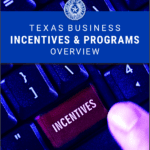Available Incentives
Local Incentives
Local incentives can be discussed prior to action by a government entity but they should not be considered a commitment until the entity takes formal action on the incentive agreement. Typically this requires the approval of the EDC Board and the approval of the City Council. In all cases the company will be required to commit to specific investment levels, a specific time frame in which to make that investment, a minimum estimate of the number of employees that will work in the company on the site within specific time frames and the levels of compensation that will be paid to those employees.
Typically all incentives can be confirmed within thirty days or less of the completion of application.
This incentive includes the abatement of City and County ad Valorem taxes over a specific period of time. The term of the abatement is based on the Company’s stated cost of the building and improvements included within the project as well as the value of any new major equipment purchases. Increased investment will qualify for a longer term of abatement and a greater percentage of the tax which is abated.
Tax abatements can only be approved by the City Council and Titus County Commissioners and are based on the governing bodies Tax Abatement Policy. The minimum investment required for a tax abatement is $ 500,000. To qualify the company must be a manufacturer, a major wholesale distributor of product, or engaged in the residential health care business (Nursing home).
Tax abatements require a commitment to make the pledged investment and report the values of that investment to the Titus County Appraisal District. The company must be open and employ the stated number of employees, remain open and operational for a specific period after the abatement expires and not be in default on taxes owed. Failure to meet these requirements can cause the abatement to be canceled and abated taxes to be paid.
Texas does not have a State Income Tax. For that reason, a large component of taxation to support government services comes to the Cities, Counties, and School Districts from Sales Taxes and from Ad Valorem Taxes. Many communities and School Districts continue to place and Ad Valorem Tax on inventories. Titus County and the Mount Pleasant Independent School District have chosen to not tax “Freeport Goods”. By definition, Freeport Goods are:
. . . goods, wares, merchandise, other tangible property . . . are exempt from ad valorem taxation if: (1) the property is acquired in or imported into this State to be forwarded outside this State . . . (2) the property is detained in this State for assembling, storing, manufacturing, processing, or fabricating purposes . . . ; and (3) the property is transported outside this State not later than 175 days after the date the person acquired or imported the property in this State.
The “Freeport Tax Exemption” can be huge to both manufacturing concerns that ship a large portion of their goods outside the State of Texas and to Distribution operations which cover territories outside the State.
Companies considering a location to Mount Pleasant, within the city limits of the community, may also qualify for “Freeport Exemption” from the city through a “380 Agreement”. In this case, the company would pay the taxes and the city would then reimburse that payment to the company. This agreement may be based on specific criteria including a specified employment number and specific initial investment in real property within the City.
The combination of the County and MPISD Freeport Exemptions along with the 380 Agreement from the City can give you a “Triple Freeport Advantage”. One more reason we say the Mount Pleasant is “One Community With All The Advantages.”
Cash grants are pledged for a new location of a primary industry or for a major expansion of an existing industry. The amount of the grant may be used for a variety of purposes – employee training, to offset cost of construction and/or purchase or relocate equipment.
Grants are offered with a “note payable” which is forgiven when the company completes the specific pledged investment or verifies the hiring of specific number of employees.
Land owned by the Economic Development Corporation may be gifted to a company on the company’s pledge to construct a building of specific size and value and become a primary employer in the City.
The value of the land is included in a note payable which can then be forgiven upon completion of the agreed upon improvements and the company begins its daily operations.
The EDC may advertise for employment for a specific classification of jobs as a means to verify to the company that qualified employees reside in the area and are seeking employment.
Employees may be tested for specific skills defined by the employer or screened for knowledge or skills.
The EDC or Northeast Texas Community College may agree to provide specific training in a field of endeavor and may be able to train employees on company owned equipment. Training may be done in conjunction with a new location or expansion. Training may be supplemental to or in addition to that offered by the State or local Workforce Board.
May be coordinated for the company by the EDC at no cost. These services may include:
- Pre-employment Drug Testing by Titus Regional Medical Center
- Real estate searches for Commercial or Residential properties
- Coordination of community tours (housing, schools etc.)
- Detailed analysis of Demographics or Community Markets
- Professional guidance through State Applications/Incentives
State Incentives
Generally the EDC cannot pledge a state incentive. Our policy is to make the prospective primary employer aware of those incentives which the company may qualify for and to partner with the company in seeking those incentives. When necessary, the EDC can employ professional program specialist to prepare applications.
These state incentives will in almost all cases require a specific pledge or employer commitment. These will generally be made in terms of employment, salaries or payroll total and investment in plant and equipment. In almost all cases the company must provide financial and ownership data.
The EDC Staff can assist the company in the identification of those programs which the project will qualify for. The EDC will also aggressively lobby for approval.
This fund is commonly known as the Governor’s Enterprise Fund. Applications for this fund are considered when the company is making major expansions within the state of Texas and paying above the counties pay scale for the various job skills required.
This is a Deal Closing Fund and is used only when the project is being considered in other states. It is never used as an incentive between Texas communities. The company must be considering a minimum of one out of state community and only one Texas community.
The amount of the incentive award is based on the effort generated by the community and the net economic impact of the location/expansion to the State of Texas. Approval of the fund is made by the Governor, the Lieutenant Governor and the Speaker of the Texas House of Representatives.
The Texas Enterprise Zone Program is an economic development tool for local communities to partner with the State of Texas to promote job creation and significant private investment that will assist economically distressed areas of the state.
The State Legislature makes funds available to industry and funnels the training dollars though the local community colleges who contract with the industry to provide the training. In most cases the project must include the components of new investment in facility and/or equipment.
The Skills Development Fund is an innovative program created to assist Texas public community and technical colleges finance customized job training for their local businesses. The Fund was established by the Legislature in 1995 and is administered by the Texas Workforce Commission. Grants are provided to help companies and labor unions form partnerships with local community colleges and technical schools to provide custom job training. Average training costs is $1,800 per trainee; however, the benefit may vary depending on the proposal.
The Product Development and Small Business Incubator Fund (PDSBI) is a revolving loan program financed through original bond issuances. The primary objective of the program is to aid in the development, production and commercialization of new or improved products and to foster and stimulate small business in the State of Texas.
The Self-Sufficiency Fund is a job-training program that is specifically designed for individuals that receive Temporary Assistance for Needy Families (TANF). The program links the business community with local educational institutions and is administered by the Texas Workforce Commission. The goal of the Fund is to assist TANF recipients become independent of government financial assistance.
The Fund makes grants available to eligible public colleges or to eligible private, nonprofit organizations to provide customized job training and training support services for specific employers. A joint application from the employer and the eligible public college and/or eligible private, nonprofit organization is required to be submitted to the Local Workforce Development Board for review and comment prior to approval.
The Capital Access Program (CAP) is a partnership between the State of Texas and selected non-profit lenders to increase access to financing for small and medium-sized businesses and non-profits which face barriers to accessing capital or fall outside of guidelines of conventional lending. The Program facilitates loans which are underwritten by the participating non-profit lenders and supported by the state contributions to a loan loss reserve fund.
The Opportunity Zone Program was created through the Tax Cuts & Jobs Act of 2017, and is a federal initiative administered by the U.S. Department of Treasury. The program is designed to spur economic development and job creation in distressed communities throughout the United States. The program offers incentives, in the form of capital gains tax abatement, for those who invest eligible capital into Qualified Opportunity Zone assets.
The Spaceport Trust Fund (STF) is a financial tool to support the development of infrastructure necessary or useful for establishing a spaceport in the State of Texas. Fund proceeds are available to any spaceport development corporation which has secured a viable business entity if that entity is capable of launching and landing a reusable launch vehicle or spacecraft and intends to locate its facilities at the development corporation’s planned spaceport in the state.


